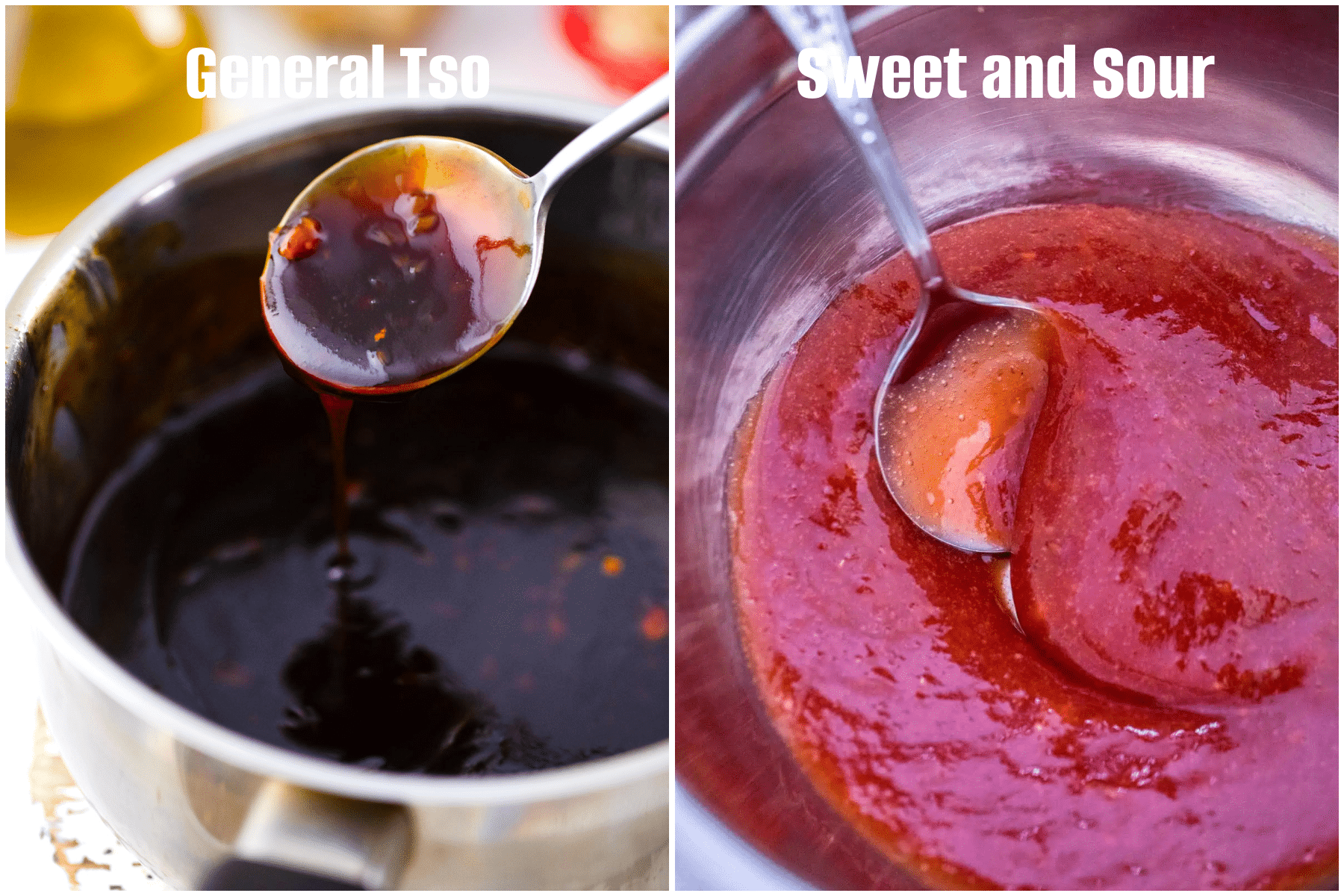This General Tso Sauce is rich, sweet, and spicy, making it perfect for all your favorite stir-fry dishes. Once I learned how to make it at home, it completely changed the way I cook. I use it for marinating meat or tofu, and even as a dip. The first time I tasted it, I was completely hooked. And yes, you can make it too in just 10 minutes. This homemade version truly puts any takeout or store-bought sauce to shame.
General Tso sauce is incredibly popular, and you’ll almost always see General Tso Chicken on every Chinese takeout menu. So the next time you’re craving takeout, skip the delivery and make it at home instead! I promise, it’s quicker, tastier, and so satisfying, especially if you’re using my homemade General Tso sauce recipe.
When I’m cooking for a living, I’ve picked up a few tricks that help me get things done faster. Hear me out, any recipe can turn out bland, even if you’re using the best ingredients. That’s why flavor matters so much. Having a few good sauce recipes up your sleeve can make all the difference.
General Tso’s chicken is a sweet, spicy, crispy chicken dish that has become a staple of Chinese-American cuisine. The sauce is what really makes this dish stand out – it has a perfect balance of savory, sweet, spicy, and tangy flavors. But what exactly is in the iconic General Tso’s sauce? Let’s take a closer look at the origins and components of this tasty sauce.
A Brief History of General Tso’s Chicken
While General Tso’s chicken is now a menu staple across the United States, its origins can be traced back to Taiwan in the 1950s. The dish was supposedly invented by Chef Peng Chang-kuei who had fled China after the Communist revolution. He created the dish to cater to American tastes by tweaking a traditional Hunanese dish.
The dish didn’t make its way to the US. until the 1970s, when Chinese immigrants brought their adapted version of General Tso’s chicken to America It quickly became popular, spreading from New York City’s Chinatown to Chinese restaurants nationwide.
Over the years, the recipe has continued to evolve and vary based on regional tastes. But the essential sweet and spicy sauce remains at the heart of every order of General Tso’s chicken.
The Sauce Ingredients
Kitchens and chefs can make General Tso’s sauce recipes that are very different from one another. But most of them have the same basic ingredients that give them their unique flavor:
-
Added sweetness—The chili pepper heat needs to be balanced by sweetness in the sauce. White sugar and brown sugar are usually used. Honey or agave nectar can provide sweetness too.
-
Acid – Rice vinegar, rice wine, sherry vinegar, or chinkiang vinegar contribute a tangy acidity. They cut through the rich sweetness.
-
Soy sauce – This provides saltiness and savory umami flavor. Many recipes use regular soy sauce, but low-sodium soy sauce is healthier.
-
Hoisin sauce—For real Chinese flavor, you need the thick, sweet and spicy hoisin sauce. It contains garlic, chilies, and fermented soybeans.
-
Chicken stock—A little chicken broth adds moisture and a tasty, meaty base. Vegetable broth can be substituted to make it vegetarian.
-
Cornstarch – This thickens up the sauce so it nicely clings to the crispy fried chicken.
-
Aromatics – Ginger, garlic, scallions, and/or chili peppers are commonly used to add zing.
-
Spices – A pinch of red pepper flakes or cayenne pepper brings heat. Five-spice powder provides extra seasoning.
-
Oil – A splash of sesame oil finishes it off with nutty aroma.
So in short, General Tso’s sauce combines sweet, salty, spicy and umami flavors in a syrupy base that perfectly balances crispy fried chicken. The exact ingredients and proportions vary between recipes, but this covers the key components.
How to Make General Tso’s Sauce at Home
Want to skip the takeout and make tasty General Tso’s chicken at home? The sauce is actually pretty easy to whip up with pantry ingredients.
Here is a basic recipe to try:
Ingredients:
- 3 cloves garlic, minced
- 1 tablespoon grated fresh ginger
- 3 tablespoons rice vinegar
- 1/4 cup soy sauce
- 3 tablespoons hoisin sauce
- 1/2 cup chicken broth
- 3 tablespoons white sugar
- 3 tablespoons brown sugar
- 1 teaspoon red pepper flakes
- 2 tablespoons cornstarch
- 1 tablespoon vegetable oil
- Sesame oil to taste
Instructions:
-
In a bowl, whisk together all of the sauce ingredients except for the vegetable oil and sesame oil.
-
Pour the sauce mixture into a saucepan and bring to a boil over medium-high heat. Reduce heat and simmer for 2-3 minutes, stirring constantly, until thickened.
-
Remove pan from heat and stir in vegetable oil and a few drops of sesame oil to taste.
-
Allow sauce to cool slightly before tossing with fried chicken.
-
Pour the sauce over crispy fried chicken pieces and garnish with scallions. Enjoy!
The great thing about making General Tso’s sauce yourself is that you can tweak it to your preferences. Like it extra sweet or spicy? Simply adjust the brown sugar or red pepper flakes. You can also bulk-prepare a batch of the sauce to keep on hand in the fridge for easy weeknight chicken dinners.
How Restaurants Use General Tso’s Sauce
Now that you know how to recreate that General Tso’s sauce flavor at home, let’s look at how restaurants actually prepare and serve the dish. At Chinese restaurants, General Tso’s sauce is used in a few different ways:
-
As a cooking sauce – Chicken pieces are briefly marinated in General Tso’s sauce to impart flavor before being fried. The cooked chicken is then tossed again in the sauce before serving.
-
As a finishing sauce – Chicken is fried first, then tossed in prepared General Tso’s sauce right before plating.
-
As a dipping sauce – Some restaurants serve the sauce on the side for drizzling or dipping the crispy chicken bites.
-
As an ingredient – General Tso’s sauce can be incorporated into other menu items too. It’s used in potstickers, spring rolls, or cauliflower “wings”.
-
As a retail product – Many restaurants bottle and sell their General Tso’s sauce for home cooking. This allows customers to recreate the dish with authentic flavor.
So General Tso’s sauce can do double duty as both a marinade and a finishing sauce in restaurants. Its versatility is part of what has made it such a hit across America.
Common Ways to Customize General Tso’s Chicken
While the General Tso’s sauce is the star of the dish, there are many ways to customize and tweak this Chinese menu staple:
-
Protein substitutions – Popular options are tofu, shrimp, salmon, chicken breast or thigh meat.
-
Veggie additions – Broccoli, snap peas, bell peppers, mushrooms, or water chestnuts are commonly mixed in.
-
Rice or noodles – It can be served with a side of steamed rice, fried rice, lo mein noodles, or chow mein noodles.
-
Extra spice – Ask for extra chili peppers or hot sauce if you like it seriously spicy.
-
Less sauce – Request light sauce if you want the focus on the crispy chicken, not the sauce.
-
Sauce on the side – The sauce can come on the side for dipping if you want to control the sauce ratio in each bite.
-
No sauce – For lower carb options, get the chicken without sauce and seasoning on its own.
There are so many ways to change up your General Tso’s chicken order! Just be sure to keep that signature sweet and spicy General Tso’s sauce as the base.
FAQs About General Tso’s Chicken
Here are answers to some of the most frequently asked questions about General Tso’s signature dish:
Who was General Tso?
General Tso was a military leader in China’s Qing dynasty in the late 1800s. But the chicken dish is just named after him – he didn’t actually invent it himself.
Is General Tso’s chicken authentic Chinese food?
No. The dish was invented by a Taiwanese chef specifically to appeal to American tastes. It’s considered Chinese-American cuisine instead of authentic Chinese food.
What’s the difference between General Tso’s sauce and sweet and sour sauce?
While both are sweet, General Tso’s sauce uses hoisin and chili peppers for a spicier, more savory and thicker texture compared to bright red sweet and sour sauce.
Is General Tso’s chicken gluten free?
Most restaurant General Tso’s chicken contains gluten from soy sauce and potentially from breading. But it can be made gluten free at home by using tamari and avoiding wheat flour coatings.
Can you make General Tso’s sauce without hoisin?
Yes, you can mimic hoisin flavor by substituting a mix of barbecue sauce, Sriracha, and Chinese five-spice. But hoisin sauce is recommended for true authentic flavor.
Is General Tso’s chicken healthy?
It can be a healthy option if made with lean white meat chicken and fresh veggies. But the fried chicken, starch, sugar, and sodium make most takeout versions less nutritious. A homemade version is best for controlling nutrition.
In Conclusion
General Tso’s chicken has become a staple of Chinese-American cuisine thanks to its crave-worthy sweet and spicy sauce. While recipes vary, the basic components include soy sauce, vinegar, chili peppers, hoisin sauce, garlic, ginger, sugar, and cornstarch. The sauce can be used for cooking, dipping, or finishing crispy fried chicken. Make your own from scratch at home for a fresh and customizable version any night of the week. General Tso’s chicken may not be authentic Chinese food, but it’s certainly become a beloved fusion dish across America.
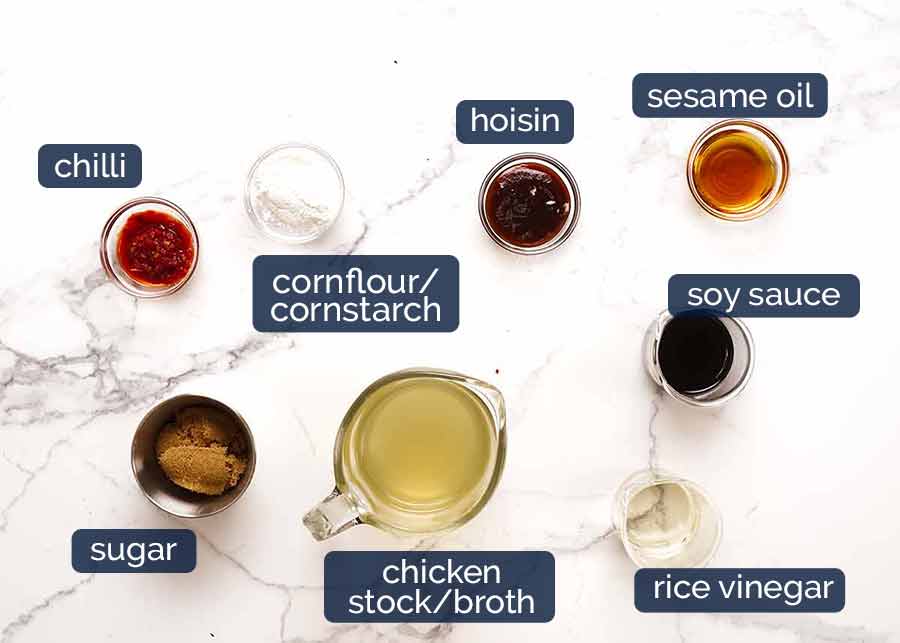
Why you will love this recipe
- You’ll want to make this sauce all the time because it’s so easy. I can make it in one pot with soy sauce, hoisin, rice vinegar, and fresh ginger, which are all things I always have on hand. It only takes ten minutes and always works out great.
- Enjoy it again later: I often make twice as much and freeze some for later. It lasts a long time and speeds up the next time you make dinner.
- Yes, this homemade version is much better than anything I’ve bought in a jar. It has a lot more flavor. It tastes good, has a little heat, and is made with real things like brown sugar, ginger, and garlic.
- There are many ways to use this sauce. I like to use it as a dip, a sauce for stir-frying, or even a quick glaze for chicken or tofu.
What you will need
Over the years, I’ve loved eating at traditional Chinese restaurants in New York and New Jersey. Those experiences helped me understand how truly authentic Chinese recipes should taste, especially when it comes to sauces. To make this one at home, you’ll just need a few simple staples like:
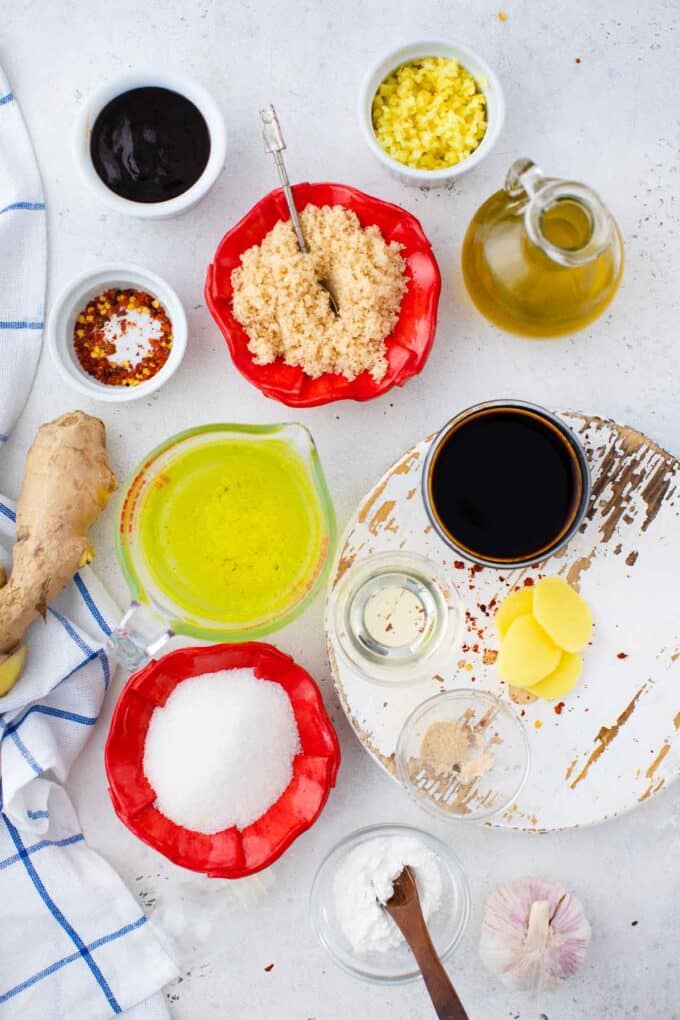
- The savory and tangy base of the sauce is made with a mix of rice vinegar, soy sauce, hoisin sauce, and low-sodium chicken broth.
- Sweeteners: White and brown sugar are used to make General Tso sauce sweet and sticky in the way that people love it.
- Adding minced ginger, garlic or garlic powder, and a pinch of red pepper flakes gives the dish depth and just the right amount of heat.
- A little cornstarch is all it takes to make the sauce thicker and give it that shiny, stickiness.
Mix in everything for the sauce. This is one of the easiest recipes you’ll ever make, and I promise you, you can’t go wrong. I simply combine all the ingredients in a pot, no need to worry about the order. To help visualize, I’ve added an below. Then, I cook it over medium-high heat for about 3 to 5 minutes, stirring constantly until the sauce thickens perfectly.
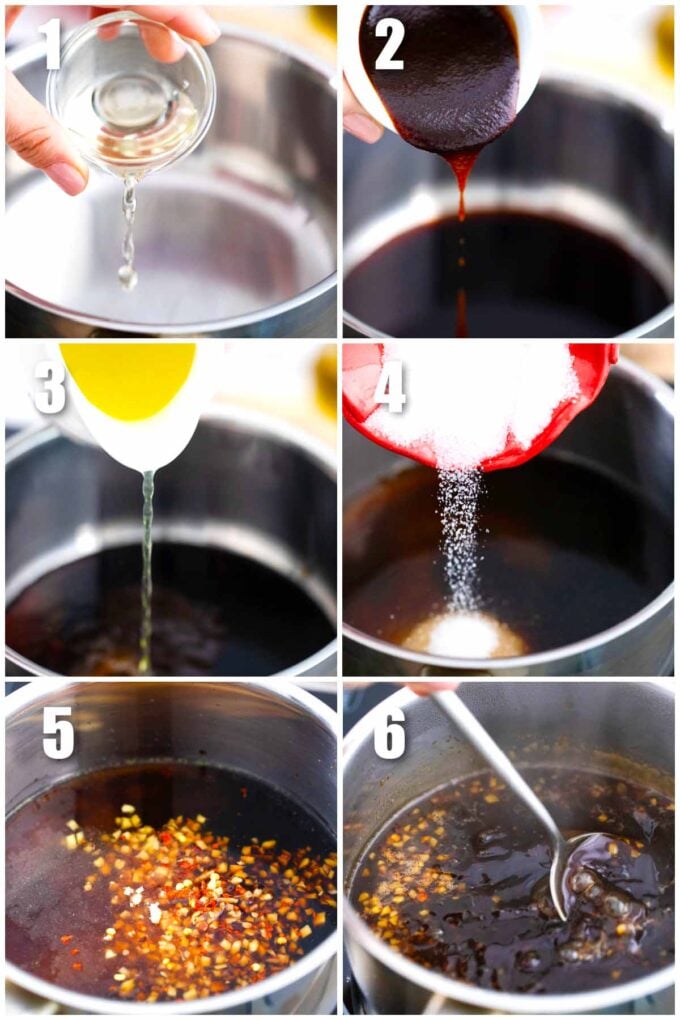
Thicken and serve: Let the sauce thicken for about 5 minutes, then remove it from the heat. It can be used right away, or if you don’t want to, let it cool completely and put it in a clean jar or container to use later.
When I first started making sauces at home, I realized the biggest difference between store-bought and homemade was the use of fresh aromatics. I always make sure to use fresh garlic, ginger, and green onions whenever I can. These ingredients instantly make the flavors better and give the sauce a bright, sharp kick that you can’t get from a jar.
- I always whisk the sauce ingredients well before cooking. This helps make sure that everything mixes well and stops lumps from forming when cornstarch is added to thicken.
- Hoisin sauce gives food a real Chinese taste, but if you don’t have any, you can mix some Chinese five-spice powder with barbecue sauce and Sriracha. But I really think you should get hoisin. It’s used in a lot of Chinese dishes and stays good for a year in the fridge.
- Garlic isn’t for everyone, so if you want a mild taste, use garlic powder. But if you like your garlic stronger, fresh minced garlic is the way to go.
- If you want something with a stronger flavor, chinkiang vinegar is a great choice instead of rice vinegar. I like adding it to some of my recipes to make them taste better.
- To make it gluten-free, use tamari instead of soy sauce and gluten-free hoisin sauce. This way, you can enjoy all the taste without having to worry about gluten.
- Substitutes for sugar: You can use 6 tablespoons of honey or agave instead of the sugar in my recipe. You can use 6 tablespoons of erythritol or monk fruit sugar instead of sugar if you’d like a lower-carb option. These other options sweeten the sauce just as well without taking away from the flavor!
- Add more red pepper flakes or chopped fresh chili to make it even spicier.
This sauce is incredibly versatile. I often use it in stir-fries with meat, veggies, or whatever I have on hand. It’s also fantastic as a dipping sauce for avocado egg rolls or drizzle it on top of my crispy tofu salad.
It works wonderfully as a marinade for chicken, pork, or beef. I highly recommend using it for baked chicken breasts, roasted pork loin, or even as a glaze for this homemade meatloaf, it adds so much flavor to everything!
- Refrigerator: This should be used up within two to three weeks after being put in the fridge.
- Freezer: If frozen, this can be kept for 3 months. This is especially helpful when you make a lot of food at once and put portions in Ziploc bags to keep on hand.
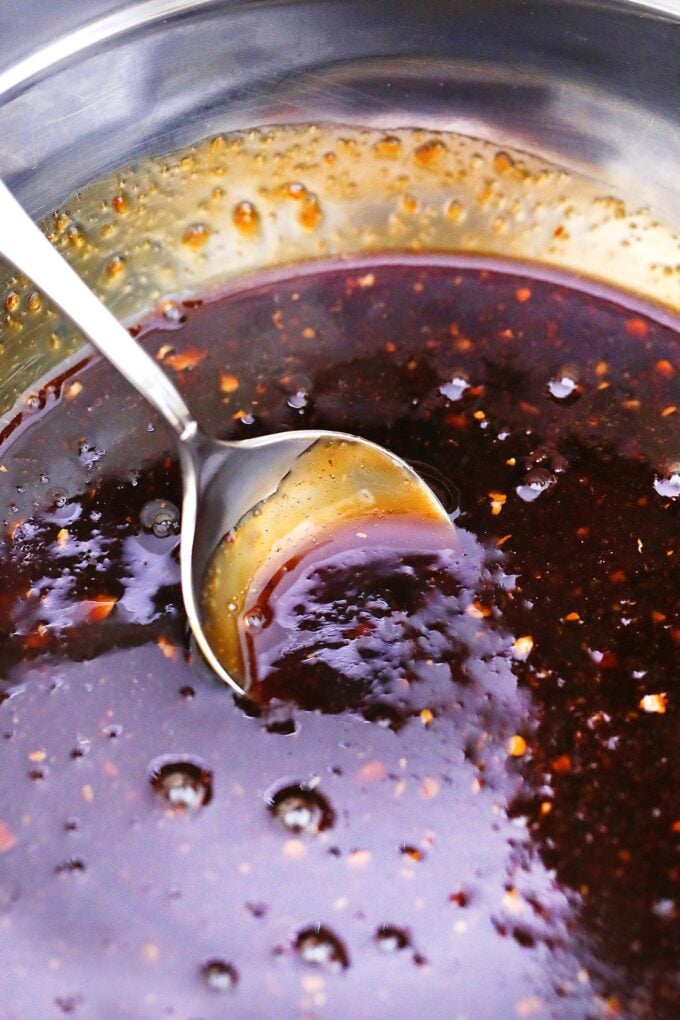
It is used in the famous Chinese takeout dish, General Tso Chicken. It is named after a Chinese leader from the Qing dynasty, Zuo Zongtang, whose romanized name is Tso Tsungtang. History has it that a certain Chef Peng invented the dish and served it in his restaurant in Taiwan. From this original recipe, the Chinese immigrants in the US developed the present-day recipe in the 1970s. The version that we know now is tweaked to please the American palate – a little bit sweeter than the original version which is hotter and of Hunanese influence.
It is the perfect and balanced combination of sweet and savory flavors. It has notes of sour, tangy, and mildly spicy all at once. The sauce has a sticky texture and tends to thicken when refrigerated. It goes hand in hand with crispy chicken and veggies, as served in General Tso Chicken.
That is the case when the sauce was not simmered enough, or a thickener like cornstrach slurry has not been used. I recommend, mixing about a teaspoon of cornstarch with two teaspoons of water, until fully dissolved, and add the mixture to the sauce. Simmer it for a few minutes, and repeat if needed. Keep in mind that the sauce will thicken more once it cools.
While both are sweet and savory sauces, and have some similarities, they are NOT the same. Each one possesses very distinctive features. General Tso Sauce leans more towards the savory palette, with an umami flavor from the Hoisin sauce that is not used in Sweet and Sour Sauce.Sweet and sour sauce is a bit more acidic, sweeter, and not as spicy. Usually, it has some pineapple juice in the ingredient list, and the umami flavor comes from the Ketchup that is added. They also look different visually, with the General Tso being darker and the other almost a bright red color.